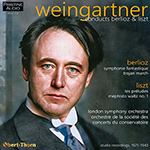
This album is included in the following sets:
This set contains the following albums:
- Producer's Note
- Full Track Listing
- Cover Art
The present release brings together all of Felix Weingartner’s recordings of the music of Berlioz and Liszt, excepting the latter’s two piano concertos. The choice in repertoire might seem unusual for a Classicist admired for his Beethoven performances; yet, Weingartner was also a champion of Berlioz, particularly before the First World War, when he co-edited the first published edition of all of the composer’s works. Although he continued to perform Berlioz until nearly the end of his career, the two works presented here constitute his complete legacy of the composer’s works on disc.
Weingartner had first recorded the Symphonie Fantastique acoustically during four sessions in March, 1925. However, that version was never released due to the arrival of electrical recording, which was by then already being used by English Columbia’s American affiliate. The performance heard here, recorded in October and November, 1925, appears to be the earliest issued Classical electrical recording made by English Columbia, although the label had previously released some electrics made by American Columbia.
While there is cramped sound from the small Petty France Studio, limited frequency range, and audible variation in sonic detail over the three sessions, Weingartner’s flexible tempi in this score belie his reputation for (as critic Jonathan Woolf put it) “patrician imperturbability”. Perhaps the only really troublesome moment in the performance is the beginning of the final movement, which is taken at a ridiculously fast tempo that blurs the opening measures.
His second and final foray into Berlioz on disc was the brief, exciting “Trojan March” from the composer’s opera, Les Troyens, captured in much more impactful sonics fourteen years later. This was one of an extensive series of recordings he made in Paris with the Conservatoire orchestra during the 1938-39 season; and his energy and control here, as in the Liszt recordings which followed, is amazing for someone in his 76th year.
Weingartner’s legacy of Liszt recordings was not quite as slim as those of Berlioz: the two Piano Concertos with Emil von Sauer as soloist (Paris, December 1938) and the tone poems presented here. The latter were recorded at the same session in February, 1940, with a young Walter Legge as producer. The orchestra was, again, the London Symphony, although the London Philharmonic was credited on the labels of the Mephisto Waltz.
Even though the LSO was probably at that time considered the least of London’s three major orchestras (behind Beecham’s LPO and Boult’s BBC SO), their playing is at a notably higher level than it had been fifteen years earlier for the Symphonie Fantastique. This was a testament, at least in part, to the rising orchestral standards brought on by the dissemination of electrical orchestral recordings and the comparisons they enabled to such first-rate ensembles as those found in Amsterdam, Philadelphia and Boston, a revolution that was helped along by that very same pioneering 1925 recording.
The sources for the transfers were American Columbia “microphone” label pressings for Les Préludes and the “Trojan March”, English Columbia pressings for the Mephisto Waltz (which was only issued in the UK and Argentina), and American Columbia “Viva-Tonal” pressings for the Symphonie Fantastique.
Mark Obert-Thorn
WEINGARTNER conducts Berlioz and Liszt
1. LISZT Les Préludes,
S97(14:44)
Recorded 28 February 1940 in Kingsway Hall, London ∙ Matrices: CAX
8733-2, 8734-2, 8735-2 & 8736-2 ∙ First issued on Columbia LX 877/8
2. LISZT Mephisto Waltz
No. 1, S110, No. 2(10:35)
Recorded 28 February 1940 in Kingsway Hall, London ∙ Matrices: CAX
8737-3, 8738-2 & 8739-2 ∙ First issued on Columbia LX 897/8
3.
BERLIOZ Trojan March from Les Troyens
(4:47)
Recorded 21 July 1939 in the Théâtre Pigalle, Paris
∙ Matrix: CLX 2187-1 ∙ First issued on Columbia LX 861
BERLIOZ Symphonie fantastique, Op.
14
4. Rêveries – Passions (12:22)
5. Un bal (6:41)
6. Scène aux champs (14:41)
7. Marche au supplice (4:18)
8. Songe d’une nuit du sabbat (9:11)
Recorded 28 & 29 October and 1 November 1925 in the Columbia Petty
France Studio, London ∙ Matrices: WAX 1111-2, 1112-2, 1113-2, 1114-2,
1115-3, 1116-2, 1117-3, 1118-2, 1119-2, 1120-1, 1121-3 & 1122-3
First issued on Columbia L 1708/12
London Symphony
Orchestra (Tracks 1, 2 and 4 – 8)
Orchestre de la Société des
Concerts du Conservatoire (Track
3)
Felix Weingartner, conductor
Producer and Audio Restoration Engineer: Mark Obert-Thorn
Total timing: 77:23

